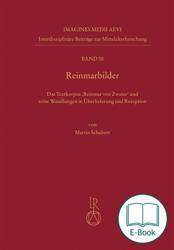Reinmar von Zweter is the most important Sangspruch poet between Walther von der Vogelweide and Frauenlob. Within German poetry of the time, the transmission of his works is unique in two ways. A systematic collection of his Sangsprüche must have taken place during his lifetimes, and the fragments of his ‚Leich‘-poem, from the 13th century, are older than any other manuscript of the genre. In a detailed analysis of the manuscripts, changing attitudes towards this oeuvre can be perceived. Each manuscript creates a certain image of the poet. The author portrait in the ‘Codex Manesse’ and the fictional character 'Reinmar' in the 'Wartburg Contest' can be considered as further aspects of perception. The literary study of the main body of Reinmars Sangsprüche opens up new perspectives on the oeuvre and on the innovations within.
Reinmar von Zweter is the most important Sangspruch poet between Walther von der Vogelweide and Frauenlob. The impressive corpus of poems attributed to him contains political, didactic, and spiritual stanzas as well as the religious ‚Leich‘. The reception of this corpus in the 13th century and long thereafter is quite extraordinary. Nevertheless, this oeuvre has not been the focus of a more detailed study since Gustav Roethe's comprehensive Reinmar edition (1887). For a long time, the oeuvre has been used for biographical interpretations only. Here, the aspect of the 'Reinmar images' emphasizes the various perspectives when looking at the poems. A detailed manuscript analysis shows how different images of ‘Reinmar’ were activated with each manuscript. The fact that the transmission can be traced back to an old Sangspruch collection, most likely from the author's lifetime, connects him in a special way with the manuscript culture of the 13th century. The Leich was intensively received, according to the number of manuscripts and the Latin contrafactum; the early fragments from the 13th century are unique within the genre. Reinmar images span from the written records and the picture in the Codex Manesse, over the fictional character 'Reinmar' in the 'Wartburg Contest' and references by other poets. For the notorious invective doenediep, it is argued that the ambiguity might be intentional. In the chain of images, Roethe's edition is considered another construct.
The literary study of the core corpus is divided in thematic cross sections. Special attention is paid to the catechetic aspects of the religious stanzas, the educational background, the role of the speaker, witticisms, and religious subtexts. In this case, the concept of the ‘author’ is not the aim of a biographical construct, but rather an index function of the texts which points to a moment in the history of literature. Thereby, new perspectives are opened on the innovations of an oeuvre that should not be considered epigonal again.
Martin Schubert, born in 1963, is a scholar of Mediaval German Studies. He earned his Ph.D. in 1990 and his Habilitation in 2002, both from Cologne University. From 2000 to 2016, he worked at the Berlin-Brandenburg Academy of Sciences and Humanities, and since 2016, he is a Professor of German Studies/Medieval Studies at the University of Duisburg-Essen. His research focuses on medieval poetry, religious literature in the Middle Ages, and editorial science and practice. He leads editorial projects in Mediaeval German Studies ("Regenbogens Langer Ton", "Österreichischer Bibelübersetzer," among others) and is editor of the editorial series "Deutsche Texte des Mittelalters."
This series, which will comprise doctoral and professorial dissertations and other monographs as well as collective volumes, aims at highlighting and promoting interdisciplinarity in Medieval Studies even more than is currently the case. Works from all branches of Medieval Studies will be accepted, provided they emphasise the aspect of interdisciplinarity, i.e. they attempt to transgress the boundaries of any single subject.


 Sample
Sample